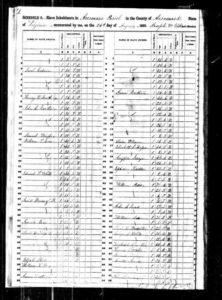
Liberals and progressives routinely accuse conservatives of being racist. But conservatives can’t match liberals and progressives for their all-consuming obsession with race. The latest example is an article in Spectator USA delving into the ancestry of Governor Ralph Northam, highlighting the fact that his ancestors owned at least 84 slaves.
Author J. Arthur Bloom does not argue that the sins of the father are to be laid on the children, but he does find implausible a claim by Northam that he learned about his family’s slave ownership only in 2017. “That story is harder to believe once you see that three out of the four grandparental lines of his family owned slaves. Two branches owned at least two dozen.”
The reason why this matters is Gov. Northam claims to have found out about this from his father, Westcott Northam. Westcott’s grandparents would have been the children of the slave owners listed in these census records. In all three cases, the Northam descendent a generation below the owner listed in the census records – Northam’s great-grandparents – probably would have grown up around their father’s slaves also. Is it really plausible that the family did not talk about any of this before 2017?
I read Bloom’s justification for probing Northam’s ancestry, but I still don’t see why this matters.
What is Bloom suggesting here? That Northam is lying about his knowledge of when he learned that his ancestors owned slaves? What motive would the governor have for misrepresenting the truth? What possible difference does it make if he learned of the fact in 2017 or 1987? Does the date somehow magnify his blackface offense or diminish it? Does the date somehow reflect on his character or the evolution in his attitudes towards race?
I’m not a big fan of Northam’s pledge to expiate his blackface sin by enacting new socially progressive programs at taxpayer’s expense, but I have to defend him here. I find nothing implausible about his claim. Not everyone is fascinated by their genealogy. Some people, frankly, don’t care who their ancestors are.
I know not to what extent Mr. Bloom family dwells upon his family history, but I can draw some tentative conclusions based on my family’s experience. My mother is extremely interested in her ancestry and when my father was alive, he was moderately interested in his, yet neither of them revealed much to me about their great grandparents. In modern American society, the storehouse of family knowledge typically resides with the oldest members of the families, based largely on their personal recollections. As the elders die off, considerable knowledge passes with them. When my father and stepmother died two years ago, they left a treasure trove of old family photos. Just one problem: Neither my sister, nor brother nor I knew who most of the people were.
On my mother’s side, I know that one ancestor was an English cotton broker in New Orleans. I have no idea whether or not he owned slaves. I assume that, as an Englishman — Great Britain had abolished slavery decades before — he probably didn’t. But no one has bothered to check. Family lore says that he lost a fortune in Louisiana state war bonds at the end of the Civil War, and that he moved north to make his fortune. My father’s genealogical research revealed that an ancestor in Delaware did own slaves. As the story goes, my ancestor manumitted his slaves upon his death. That’s all I know. There are many other branches of my family of whose activities I have no clue whatsoever.
The fact that an ancestor owned slaves is not something that modern-day Americans are proud of. Family lore tends to gloss over unpleasant details — Aunt So-and-So was illegitimate, Great Uncle So-and-So was a drunkard and lost his business, Grandpappy So-and-So was a cattle rustler and spent time in the hoosegow — and it should surprise no one if Northam’s family declined to pass along knowledge of ancestors’ slave ownership.
Maybe the historical amnesia will end as the Narrative of Racial Oppression moves to the forefront of national debate. With all the talk of “white privilege” and reparations, it could matter very much whose ancestors owned slaves. The sins of the fathers shall be visited upon the sons, and grandsons and great grandsons. Their privilege, it will be argued, was inherited from ancestors who extracted wealth from their slaves, and they owe restitution. As the Narrative of Racial Oppression continues to mutate, perhaps Mr. Bloom’s fascination with Northam’s genealogy could foreshadow obsessions to come.

Leave a Reply
You must be logged in to post a comment.